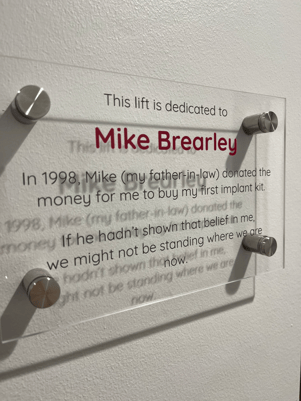A short series on getting started in implant dentistry Part 1: Introduction


So, as I promised on Sunday, there will be two mini-series of the blog over the Christmas period to keep you reading or to help you sleep if you get insomnia after eating too many mince pies and drinking too much Bailey's!
The second of the series of blogs alongside the Business of Dentistry blogs will introduce how to get into implant dentistry for anyone who might want to feel inspired over the Christmas period and who's looking towards their own personal development through 2024 and beyond.
For my part, I got involved in implant dentistry around 1995/6.
I was working with a head and neck surgeon in Derby called Keith Jones, and I was lucky enough to be looked on favourably and invited to help (no payment for this) to assist him on Saturdays in a private practice in Uttoxeter where he was placing implants in the very early stages of the implant generation.
.
I saw implants being placed under local anaesthetic with sedation in 1995/6. I saw a way that I could take surgery into practice and do the thing that I loved in the hospital in a framework of a life, which was just less ridiculous and mental.
The reason I got into implant dentistry was so that I could do surgery in practice.
I never had any idea of any financial gain in this; I never saw that I would be paid any more than I would be paid as a hospital dentist. I just saw a way of doing a thing that I loved for a job on a day-to-day basis in an environment where I might have more control, and more say about the way things were done.
For my part, it was easy to get into implant dentistry; all I had to do was go to an evening lecture and win a raffle, which gave me a free two-day course in Cambridge for Straumann (I wanted to be part of the Straumann universe for one reason or another).
I went to Cambridge, and then my Father-in-law loaned me the money to buy my first implant kit (I was totally broke); it's why my father-in-law has a sign beside the lift at the practice.
And so I got going, and that was it; I was away.
I learned as much as I could, read books, went to the ITI World Congress in 1999, and so on.
I joined the ADI and attended the ADI lectures and congresses, but I started speaking about implant dentistry early.
This is not the case anymore for people interested in implant dentistry and wanting to get involved.
When I started, it was a Wild West. It was honestly like being a prospector in another world.
I never realised that at the time, none of us did; we just went at it and did our best and tried to provide the best care we could (and sometimes it was not very good).
But moving on from that, things started to develop in education, and people began to become involved in structuring education in implant dentistry to improve it.
And so, getting involved in implant dentistry now, first of all, means understanding the commitment that is required to become good at it.
What's required in terms of an investment in financial terms but also in time (often more difficult for people) and also emotionally.
I've always told people that if you try to do this properly, implant dentistry will take you to hell and back, but if you don't do it properly, it's liable to take you to hell and not bring you back.
And so, in terms of setting things up, you must understand why you want to do this first.
There is a whole world out there that will teach people implant dentistry quickly and easily on the basis that they will make money.
Go and do that, but as I told the 150 DFTs that I was speaking to a few weeks ago, if you start by trying to be rich, you might never get good, but if you try to be good, you might get good, and you will probably also get rich.
I would start with good, whatever that looks to you; find people who look or talk or act like you. "People like us do things like this".
People who share your values, who share your ethics, who share your goals and dreams. Maybe that's as much money as possible, or that's care as well done as possible, or that's a community that supports you when things go wrong.
Look for those guys, and that's the start of your journey.
Look for the rest of the series for the rest of it.
Blog Post Number - 3663




Leave a comment